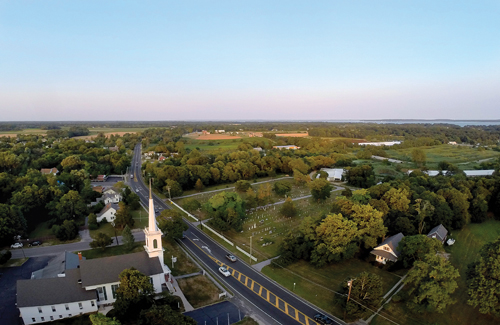Guest spot: Imaginary politics in the Main Road corridor

News-Review editors recently wrote in favor of studying the Aquebogue-Jamesport corridor. Unfortunately, they politicized the issue, saying Democrats called for a master plan update last year, but now “suddenly disagree” with the supervisor’s master plan proposal. The impression created was unflattering — and false.
It’s true Tony Coates and Laura Jens-Smith called for an update in their recent campaigns. These two Democrats speak as individual citizens (though many surmise they’re campaigning for 2017), but their positions on this issue have been consistent.
In contrast to these individual opinions, Angela DeVito speaks as longtime president of the local civic association that calls the rural corridor home. The civic has not called for a master plan update, and consistently advocates alternatives. There’s no flip-flopping here, either. Ms. DeVito happens to be a Democrat. Especially given this year’s presidential primaries, no one should presume members of a party share the same views.
I was also cited, speaking for Save Main Road. I’m aggressively independent and haven’t belonged to a party for years. (I was last registered as Republican.)
Further, Save Main Road pointedly avoids asking its members their political affiliation or preferences. Protecting the rural corridor — like all issues we work on — is nonpartisan.
Save Main Road has consistently held that master plan updates and corridor studies are not the best path forward.
Rhetoric and spin
The supervisor originally announced a corridor study by saying he’d proceed “only in response to demand from the community.” The civic, Save Main Road and the Riverhead Neighborhood Preservation Coalition responded by saying this is not the right tool or the right time.
Instead of acknowledging this clearly stated position, the supervisor said I and other civic leaders were “confused” and he’d proceed anyway. The fact that recognized experts from Group for the East End concurred with our collective view was ignored.
When the consultant’s proposal was ready, Mr. Walter asked for my input and promised (three times) to forward it for review. He never did.
At a Town Board work session, Ms. DeVito and I were eager for Q&A with the prospective consultant. Instead, nearly every question was intercepted by the supervisor. We already knew his opinion and had hoped to hear the expert’s answers.
Finally, there were concurrent discussions with Suffolk County Legislator Al Krupski and the owner of Jamesport land being considered for preservation by the county. Mr. Walter sat in and heard the owner state clearly that he’ll sell the 10-acre Main Road parcel for the right price … but then took to the radio to broadcast his contrary belief that the seller would keep this land for development.
Unless the supervisor had new info from the owner, this negative speculation that the deal would fail was wholly unfounded. If he did have new info, he should have told our county legislator, who was negotiating the deal. Either way, publicly broadcasting this gossip could only hurt — not help — the effort to build a park instead of another mall.
Taking things at face value
A “study” is when experts go into the field, conduct research, analyze data and return findings, from which recommendations are derived. What’s proposed here is, in contrast, a $43,000 excuse for predetermined action. The promise of these foregone conclusions offering some form of protection against lawsuits is hollow … and the town has a terrible litigation track record.
There’s a more basic problem. The supervisor says he wants to: a) improve the master plan and close loopholes and b) keep the rural corridor looking as it does today. This sounds terrific, but it would be foolish and irresponsible to take these pronouncements at face value.
Does the News-Review expect readers to suspend critical thinking?
Five years ago, Mr. Walter famously stated, “The master plan is a load of crap,” and railed against the constraints of restrictive Rural Corridor zoning. Could this politician so thoroughly change his stripes that he should now be viewed as champion of the master plan and protector of our quality of life? I think it unlikely.
Similarly, the editors discussed the “mission” of the Planning and Zoning Boards without looking closely at what they actually do. The one decision cited was the Jamesport Plaza variance application, recently denied. It was the right call, but I note the property owner’s name is Cardinale, and he faced an all-Republican ZBA. This appears to be a political act.
Contrast this with the unjustifiable variance given 84 Lumber, in which the ZBA thumbed its nose at both code and due process, knowing no one would hold them accountable. I’ve long warned that, when it comes to land use, this agency is more powerful than the Town Board itself.
Add to this the fact that code enforcement is highly inconsistent and inequitable — not because the town lacks competent staff, but because top-down decisions are politicized and selective.
That’s why I continue to emphasize that new and revised code — which a corridor study done right might deliver — means nothing until the ZBA is reined in and code enforcement is unleashed. Let’s have plain talk and corrective action on these fronts before we waste $43,000 and six months on more consultants.
Remember that we don’t object to a corridor study per se, but the proposal at hand is 46 pages of generic boilerplate, omitting mention of specific goals discussed. Mr. Walter hand-picked the consultant, will control the study’s scope and will, I believe, determine the outcome like a butcher with his thumb on the scale.
The editors’ assumption that opposition to the proposed study is political is inaccurate. Worse, believing that any study will automatically have a “goal of ensuring that [the corridor] remains a local treasure” is naïve.
I think it prudent to operate with code we have, closely monitoring those who administer, interpret and enforce.








